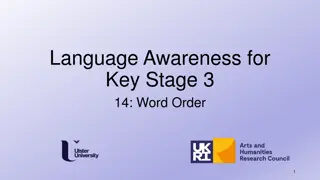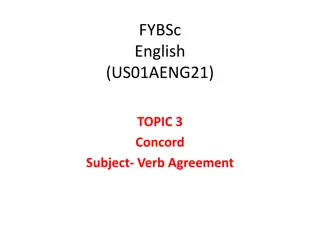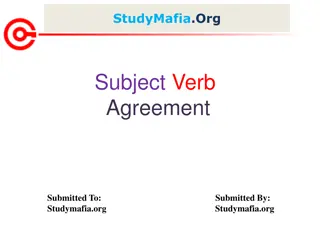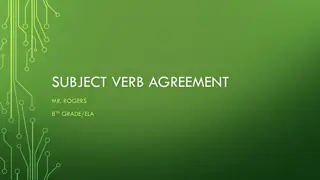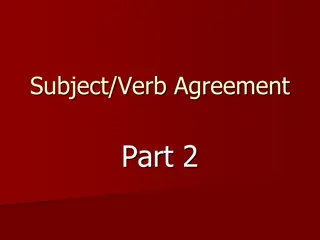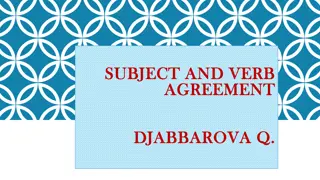Mastering Subject-Verb Agreement Rules
Subject-verb agreement is crucial in writing. Explore examples and rules to ensure your subjects and verbs align correctly in number. Learn how to handle singular, plural, compound subjects, and more for error-free writing.
Download Presentation

Please find below an Image/Link to download the presentation.
The content on the website is provided AS IS for your information and personal use only. It may not be sold, licensed, or shared on other websites without obtaining consent from the author.If you encounter any issues during the download, it is possible that the publisher has removed the file from their server.
You are allowed to download the files provided on this website for personal or commercial use, subject to the condition that they are used lawfully. All files are the property of their respective owners.
The content on the website is provided AS IS for your information and personal use only. It may not be sold, licensed, or shared on other websites without obtaining consent from the author.
E N D
Presentation Transcript
INTRODUCTION Subject verb agreement refers to the fact that the subject and verb in a sentence must agree in number. In other words, they both must be singular or they both must be plural.That is the simple principle behind subject- verb agreement. This presentation will explore some of the difficulties we have with subject- verb agreement and provide some notes about agreement problems in our own writing.
Subject-verb Agreement Examples Correct Examples- I walk. (singular) You walk. (singular and plural) He/She/It walks. (singular) We walk. (plural) They walk. (plural) Incorrect Examples: I walks. She walk. They walks.
Here are some rules to be followed for subject verb agreement: Subject Verb Agreement Rule 1. When two singular subjects are joined by the words or or nor a singular verb is in order.Example- My sister or my brother is meeting you at the airport.
Subject Verb Agreement Rule 2 Two singular subjects joined by either/or or neither/nor also need a singular verb.Example- Neither John nor Sam is available to meet you at the airport. Either Angie or Jeff is meeting at the airport.
Subject Verb Agreement Rule 3 When the word "and" connects two or more nouns or pronouns, use a plural verb. Example- She and her family are at Disney World
Subject Verb Agreement Rule 4 When a compound subject contains both a singular and a plural noun or pronoun joined by or or nor, the verb should agree with the part of the subject that is nearer the verb. Example- The athlete or his teammates sprint every day. His teammates or the athlete sprints every day.
Subject Verb Agreement Rule 5 When a phrase comes between the subject and verb, the verb has to agree with the subject, not with the noun or pronoun in the phrase. Example- Two of the puppies are whimpering. The birthday boy, along with his friends, is anxious for the party to stop.
Subject Verb Agreement Rule 6 Since doesn t is a contraction of does not it should be used with a singular subject. Example- Mary doesn t care for pizza. Don t is a contraction of do not and requires a plural subject. They don't know the way home.
Subject Verb Agreement Rule 7 Each, either, each one, everyone, neither, everybody, anyone, anybody, somebody, nobody, someone, and no one are singular so they need a singular verb. Each of the girls is qualified for the prize. Neither knows how the competition will end.
Subject Verb Agreement Rule 8 Sentences that begin with there is or there are have the subject following the verb since there is not a subject. Therefore, the verb must agree with what follows it. Example- There are many paths to success. There is one road out of town.
WORKSHEET- 1 Subject-Verb Agreement Practice Exercises 1. Everyone (has/have) done his or her homework. 2. Each of the students (is/are) responsible for doing his or her work. 3. Either my father or my brothers (is/are) going to sell the car. 4. Neither my sisters nor my mother (is/are) going to sell the house. 5. The samples on the tray in the lab (need/needs) testing. 6. Mary and John usually (plays/play) together. 7. Both of the dogs (has/have) collars. 8. Neither the dogs nor the cat (is/are) very hungry. 9. Either the girls or the boy (walk/walks) in the evening. 10. Either the boy or the girls (walk/walks) in the evening. 11. At the end of the fall (comes/come) the hard tests. 12. The slaughter of animals for their fur (has/have) caused controversy. 13. The student, as well as his teacher, (was/were) going on the field trip.
WORKSHEET- 2 Choose the correct form of the verb that agrees with the subject. 1. Annie and her brothers (is, are) at school. 2. Either my mother or my father (is, are) coming to the meeting. 3. The dog or the cats (is, are) outside. 4. Either my shoes or your coat (is, are) always on the floor. 5. George and Tamara (doesn't, don't) want to see that movie. 6. Benito (doesn't, don't) know the answer. 7. One of my sisters (is, are) going on a trip to France. 8. The man with all the birds (live, lives) on my street. 9. The movie, including all the previews, (take, takes) about two hours to watch. 10. The players, as well as the captain, (want, wants) to win. 11. Every one of those books (is, are) fiction.




